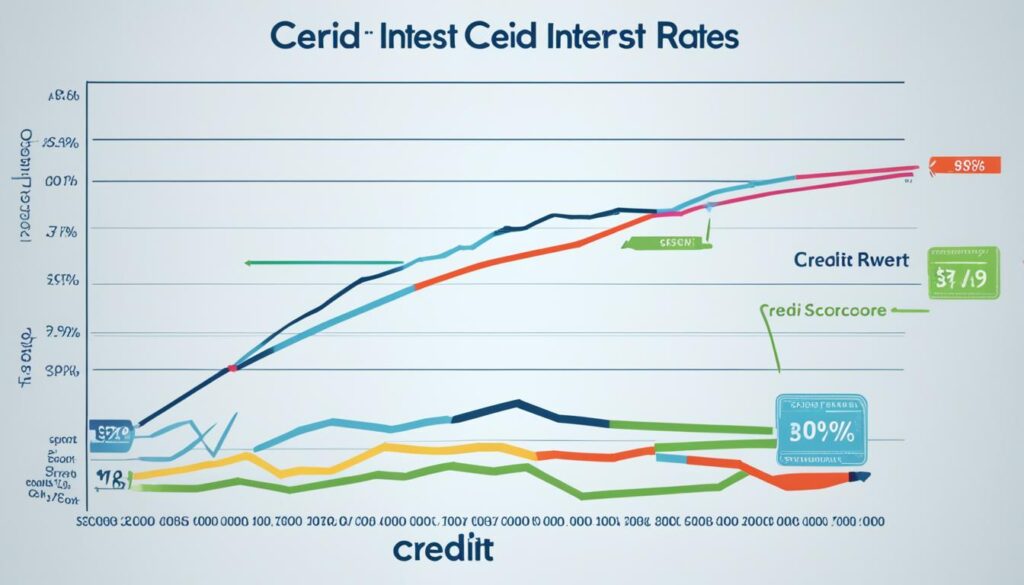In today’s financial landscape, your credit score plays a crucial role in determining your financial health. Whether you’re applying for a loan, renting an apartment, or even seeking employment, your credit score can make or break your opportunities. In this comprehensive guide, we will explore the fundamentals of credit scores and provide you with the information you need to understand how they work and why they matter.
Key Takeaways
- A credit score is a numerical representation of your creditworthiness.
- Lenders consider various factors, such as payment history, credit utilization, and length of credit history when calculating your credit score.
- Your credit score affects loan approvals, interest rates, credit card limits, renting a home, employment opportunities, and insurance premiums.
- Regularly monitoring your credit score and reviewing your credit report is essential for identifying and correcting any inaccuracies.
- Improving your credit score is possible through responsible financial habits, such as making on-time payments, reducing credit card balances, and diversifying your credit mix.
What is a Credit Score?
A credit score is a three-digit number that reflects your creditworthiness and likelihood of repaying borrowed money. It provides lenders with a quick snapshot of your financial reliability. Credit scores play a crucial role in determining your eligibility for loans, credit cards, and other financial opportunities. Understanding how credit scores work is essential for making informed financial decisions.
How Credit Scores Work
Credit scores are calculated using specific algorithms that analyze various factors related to your credit history. These factors are weighted differently and can vary slightly among different credit bureaus. Here are the key components that influence your credit score:
- Payment History: Your track record of making timely payments is one of the most critical factors in determining your credit score. Lenders want to see a history of responsible payment behavior.
- Credit Utilization: This refers to the percentage of your available credit that you are currently using. Keeping your credit utilization low can have a positive impact on your credit score.
- Length of Credit History: The length of time you have been using credit is another important factor. A longer credit history can demonstrate stability and responsible credit management.
- Types of Credit in Use: Lenders like to see a mix of different types of credit, such as credit cards, mortgages, and auto loans, as it indicates your ability to handle various forms of debt.
- New Credit Inquiries: When you apply for new credit, it can temporarily lower your credit score. Lenders consider multiple credit inquiries within a short time frame as a potential risk.
Credit Score Range
Credit scores typically range from 300 to 850. Higher credit scores indicate lower credit risk. However, keep in mind that the specific credit score ranges may vary slightly among different credit bureaus. It is important to understand where your credit score falls within the range and what it means for your financial options.
Importance of Credit Score Information
Having a good credit score opens up a world of opportunities. Lenders rely on credit scores to assess your creditworthiness and determine the terms of any credit you may seek. A high credit score can result in lower interest rates on loans and credit cards, better insurance premiums, and easier access to rental properties. It is crucial to maintain a healthy credit score to secure favorable financial outcomes.
If you want to get a visual representation of how credit scores work and the impact they can have on your financial life, take a look at the following summary table:
| Credit Score Range | Credit Risk Level | Impact on Financial Opportunities |
|---|---|---|
| 300 – 579 | Very Poor | Limited access to credit, high interest rates, difficulty renting |
| 580 – 669 | Fair | Limited credit options, higher interest rates |
| 670 – 739 | Good | Access to credit, moderate interest rates |
| 740 – 799 | Very Good | Access to lower interest rates, wider range of credit options |
| 800 – 850 | Exceptional | Access to the best financial opportunities, lowest interest rates |
Having a clear understanding of what goes into your credit score and the impact it can have on your financial life empowers you to take control of your credit and make informed decisions. Now that you know the basics, let’s explore why your credit score matters in the next section.
Why Your Credit Score Matters
Your credit score is a significant factor that lenders use to assess the risk associated with lending you money. A higher credit score increases the likelihood of loan approval and often results in more favorable interest rates. It can also play a crucial role in other aspects of your financial life, including credit card approval, renting a home, employment opportunities, and insurance premiums.
When you apply for a loan, your credit score is one of the primary factors that lenders consider. A higher credit score indicates a lower risk of defaulting on payments, making you a more attractive borrower. This can lead to quicker loan approval and potentially lower interest rates, which can save you thousands of dollars over the loan’s term.
Credit card approval is also influenced by your credit score. Lenders typically offer better rewards and higher spending limits to individuals with good credit. A higher credit score demonstrates responsible credit management and increases your chances of being approved for credit cards with attractive benefits.
Additionally, your credit score may be checked by landlords when you apply for a rental property. A good credit score suggests financial responsibility, making you a reliable tenant. Landlords are more likely to rent to individuals with higher credit scores, giving you an advantage in a competitive rental market.
Some employers may review credit reports as part of their hiring process, particularly for positions that require financial responsibilities or access to sensitive information. While your credit score alone does not determine your employability, a poor credit history may raise concerns about your financial reliability. Maintaining a good credit score can therefore enhance your employment opportunities.
Furthermore, your credit score can impact the premiums you pay for auto and homeowners insurance. Insurance companies consider credit scores as one of the factors when determining premiums. Individuals with higher credit scores may be eligible for lower insurance premiums, as they are perceived to be more financially responsible and less likely to file claims.
“Your credit score can significantly affect your financial opportunities and the terms you receive when borrowing money, applying for credit cards, renting a home, seeking employment, or obtaining insurance. It’s crucial to understand the factors that impact your credit score and take steps to maintain or improve it.”

Credit Score Factors
Various factors contribute to your credit score. The key components include:
- Payment history: Your track record of making timely payments on your credit accounts. Late payments, delinquencies, and accounts in collections can negatively affect your credit score.
- Credit utilization: The percentage of your available credit that you are currently using. Keeping your credit utilization ratio below 30% is generally recommended for maintaining a good credit score.
- Length of credit history: The duration of your credit accounts. Establishing and maintaining a longer credit history can positively impact your credit score.
- Types of credit in use: The mix of credit accounts in your name, including credit cards, loans, and mortgages. Having a diverse credit portfolio can contribute to a higher credit score.
- New credit inquiries: The number of recent credit inquiries and new credit accounts you have opened. Applying for multiple credit accounts within a short period can temporarily lower your credit score.
Summary
Your credit score is a vital component of your financial well-being. It has wide-ranging implications for loan approvals, interest rates, credit card limits, renting a home, employment opportunities, and insurance premiums. Understanding the factors that influence your credit score and taking steps to maintain or improve it can enhance your financial prospects and open doors to better financial opportunities.
Monitoring Your Credit Score
Given the significance of your credit score, regular monitoring is essential. It allows you to keep track of your financial health and ensure that your creditworthiness remains intact. By monitoring your credit score, you can spot any changes or discrepancies that may impact your financial well-being.
Many credit card companies and financial institutions provide free access to your credit score. This means you can easily check your credit score through your online banking portal or credit card app. Taking advantage of these free resources can help you stay informed about your creditworthiness and identify any areas that need improvement.
Additionally, you are entitled to a free credit report from each of the three major credit bureaus – Experian, Equifax, and TransUnion – every 12 months through AnnualCreditReport.com. This service allows you to access your credit report and review your credit history, including your payment history, credit accounts, and any negative information that may be affecting your credit score.
Regularly reviewing your credit report is crucial for detecting inaccuracies or fraudulent activity. It enables you to identify any unauthorized accounts or suspicious transactions that may harm your creditworthiness. If you notice any errors or fraudulent activity, it’s important to dispute them promptly to prevent any negative impact on your credit score.
Benefits of Monitoring Your Credit Score:
- Stay informed about your creditworthiness and financial health
- Identify changes or discrepancies that may affect your credit score
- Detect and resolve inaccuracies or fraudulent activity
- Take proactive steps to improve your credit score

“Regularly reviewing your credit report allows you to identify inaccuracies or fraudulent activity and dispute them promptly to prevent any negative impact on your credit score.”
Monitoring your credit score is a proactive measure that empowers you to make informed decisions about your finances. By staying vigilant and taking the necessary steps to protect your creditworthiness, you can ensure that your credit score remains in good standing.
Improving Your Credit Score
If your credit score needs improvement, there are several strategies you can implement. By following these credit score tips, you can take steps towards building a stronger credit score and improving your financial health.
Consistent, on-time payments
One of the most crucial factors in building your credit score is making consistent, on-time payments. Paying your bills, loans, and credit card balances on time demonstrates responsible financial behavior and can have a significant positive impact on your credit score.
Reducing credit card balances
Another effective way to improve your credit score is by reducing your credit card balances. High credit card balances can negatively affect your credit utilization ratio, which is the amount of credit you’re using compared to your available credit. By keeping your credit card balances low, you can maintain a lower credit utilization rate and increase your credit score.
Maintaining a low credit utilization rate
Your credit utilization rate is a critical aspect of your credit score. It represents how much of your available credit you are using. To improve your credit score, try to keep your credit utilization rate below 30%. By managing your credit utilization carefully, you can positively impact your credit profile and improve your creditworthiness.
Keeping old credit card accounts open
It may be tempting to close old credit card accounts that you no longer use. However, keeping these accounts open can be beneficial for your credit score. The length of your credit history is an essential factor in determining your credit score. By maintaining old credit card accounts, you can demonstrate a longer credit history, which can improve your credit score.
Diversifying your credit mix
Having a diverse mix of credit accounts can also improve your credit score. This means having a combination of revolving credit (such as credit cards) and installment loans (such as a mortgage or car loan). By adding different types of credit accounts, you can demonstrate a responsible handling of various credit obligations, which can positively influence your credit score.
Limiting new credit applications
When you apply for new credit, such as a credit card or loan, a hard inquiry is placed on your credit report. Too many hard inquiries can negatively impact your credit score. To minimize the potential negative effects, limit the number of new credit applications you make and only apply for credit when necessary.
Improving your credit score takes time, patience, and discipline. By implementing these strategies, you can actively work towards building a better credit score and improving your financial future.
How Can Understanding Credit Score Basics Help Me Improve My Finances?
Understanding credit score improvement tips can greatly benefit your financial situation. By knowing how your credit score is calculated and what factors can impact it, you can make informed decisions to improve it. This can lead to better interest rates on loans, higher credit limits, and overall financial stability.
Conclusion
Understanding the basics of credit scores is essential for achieving financial empowerment. Your credit score is not a fixed number; it evolves based on your financial behaviors. By actively managing your credit, making timely payments, and adopting responsible financial habits, you can maintain a healthy credit score and unlock opportunities for better financial outcomes. Building a good credit score takes time, patience, and consistent positive financial behaviors, but the rewards are worth it.
Remember that your credit score plays a crucial role in various aspects of your financial life. It affects your ability to get approved for loans, secure favorable interest rates, qualify for credit cards with better rewards, rent a home, and even find employment. Monitoring your credit score regularly allows you to identify any inaccuracies or fraudulent activity and take appropriate action. Utilize the free resources available to you, such as credit card companies that provide access to your credit score and the free annual credit reports from the three major credit bureaus.
Improving your credit score is an ongoing process. Consistency is key, especially when it comes to making on-time payments and reducing credit card balances. Maintaining a low credit utilization rate and diversifying your credit mix with different types of accounts can also have a positive impact. Lastly, being cautious about applying for new credit and minimizing credit inquiries can help protect your credit score from any negative effects.
FAQ
What is a credit score?
A credit score is a three-digit number that reflects your creditworthiness and likelihood of repaying borrowed money.
How does a credit score work?
Credit scores are based on specific factors that lenders consider when evaluating your credit risk, including payment history, credit utilization, length of credit history, types of credit in use, and new credit inquiries.
Why does my credit score matter?
Your credit score is a significant factor that lenders use to assess the risk associated with lending you money. It impacts loan approval, interest rates, credit card limits, renting a home, employment opportunities, and insurance premiums.
How can I monitor my credit score?
Many credit card companies and financial institutions provide free access to your credit score. You can also obtain a free credit report from each of the three major credit bureaus every 12 months through AnnualCreditReport.com.
What can I do to improve my credit score?
Strategies to improve your credit score include making consistent, on-time payments, reducing credit card balances, maintaining a low credit utilization rate, keeping old credit card accounts open, diversifying your credit mix, limiting new credit applications, and being mindful of credit inquiries.

